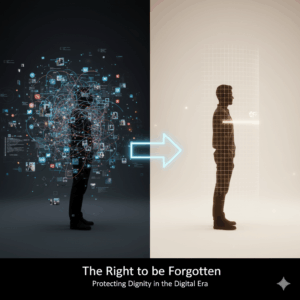Right to be Forgotten” (RTBF) “Protecting Dignity in the Digital Era”
In today’s digital era, every interaction is stored and circulated online, the question of data security privacy assumes great significance. Digital platforms have increased access but also risks of misuse. Recognizing this challenge, several nations have adopted legislative frameworks to safeguard personal data.
The “Right to be Forgotten”, means to delete information from the very source itself. This right empowers people to have their information removed when its purpose is served or it becomes inaccurate. It helps people to control their online presence. Its interpretation varies across jurisdictions, leading courts to devise different remedies. The Right to be Forgotten is an equivalent notion to the right to erasure and a key part of the Right to Informational Privacy.
Historical Background
The concept originated from the French “droit à l’oubli” or “right to oblivion,” allowing former offenders to reintegrate into society. At the global level, the RTBF gained recognition in the landmark 2014 ruling of the Court of Justice of the European Union (CJEU) in Google Spain SL v. AEPD (2014). The court decided that outdated or irrelevant personal information should not remain perpetually available online, holding that an individual’s privacy takes precedence over a search engine’s commercial interests.
The principle has been recognised as a statutory right and codified in Article 17 of the EU’s General Data Protection Regulation (GDPR) as the “right to erasure.”
Judicial and Statutory Status in India
In India, the legal foundation of this right was laid down by the Supreme Court in Justice K.S. Puttaswamy v. Union of India (2017), declared privacy a fundamental right under Article 21 of the Constitution. Though the case did not directly adjudicate the RTBF, it laid the foundation by affirming control over personal information.
Subsequent High Court rulings strengthened this right:
In Sri Vasunathan v. Registrar General (2017), the Karnataka High Court directed that the petitioner’s daughter’s name not appear in search results related to a criminal case, to safeguard her reputation. Similarly, in Zulfiqar Ahmad Khan v. Quintillion Media Pvt. Ltd. (2019), the Delhi High Court restrained republication of certain articles during the #MeToo campaign, holding that the RTBF and the “right to be left alone” were part of privacy.
In Jorawar Singh Mundy v. UOI (2021), the Delhi High Court ordered removal of an acquittal judgment from online databases. More recently, in ABC v. State & Anr. (2022), Justice Amit Mahajan emphasised that “There is no reason why an individual who has been duly cleared of any guilt by law should be allowed to be haunted by the remnants of such accusations easily accessible to the public.”
Legislatively, the Digital Personal Data Protection Act, 2023 is not yet strictly enforced in the country but Section 12 of the Act codifies the right to be forgotten as a legal right.
Privacy v. Public Interest
The core challenge in enforcing Right to be forgotten is struggle to balance an individual’s right to control their online presence with the public’s right to know. Press freedom is vital, but it cannot outweigh privacy when outdated information unfairly harms a person’s dignity and reputation.
On one side, Article 21 protects personal liberty and an individual’s reputation, while on the other, Article 19(1)(a) guarantees freedom of speech and the public’s right to know. This right is not absolute and is subject to exceptions, especially where disclosure serves public interest, criminal justice, or freedom of expression.
How to Exercise the Right
Judicially, one can approach the High Court under Article 226, to request removal of outdated or harmful personal data as it violates privacy under Article 21. While the Supreme Court has maintained caution, High Courts have provided relief in several cases.
Once fully operational, the DPDP Act will allow individuals to request erasure directly from “Data Fiduciaries,” with appeals to the Data Protection Board of India if denied.
Additionally, under the IT Rules, 2021, individuals can seek redressal through designated grievance officers of online platforms for content takedown.
Right to be Forgotten in India is evolving; rapid technological changes demand clearer jurisprudence. Courts have become sensitive to protecting reputation, and enactment of the DPDP Act will offer a structured procedural regime. In a digital society, RTBF is not about forgetting the past, but about preserving the individual’s right to move beyond it. For this reason, the law must carefully balance RTBF with free speech, transparency, and preservation of judicial records, protecting dignity while preserving freedom.
_______________________________________
Astrea Legal Associates LLP
www.astrealegal.com
Note: This publication is provided for general information and does not constitute any legal opinion.This publication is protected by copyright. © 2025,Astrea Legal Associates LLP





